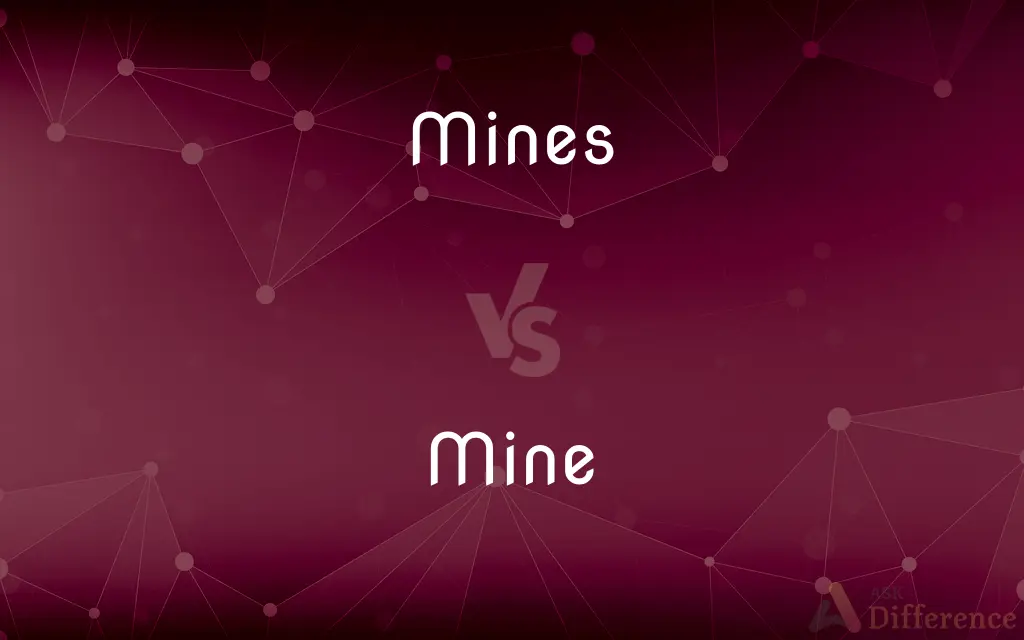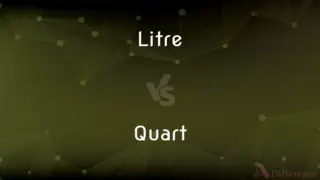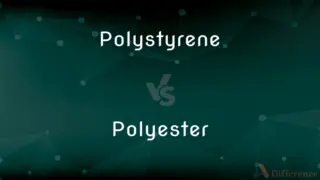Mines vs. Mine — What's the Difference?
By Urooj Arif & Fiza Rafique — Updated on March 6, 2024
Mines are excavations in the earth from which minerals and ores are extracted, while a mine refers to an explosive device planted underground or in water to detonate when triggered.

Difference Between Mines and Mine
Table of Contents
ADVERTISEMENT
Key Differences
Mines are large-scale operations involving the extraction of valuable minerals or other geological materials from the earth, typically through open pit or underground methods. These operations focus on resources like coal, metals, and precious stones. On the other hand, a mine is a type of ordnance designed to explode when activated by pressure, proximity, or a remote trigger, often used in military contexts to damage or destroy enemy vehicles or personnel.
While mines are integral to industries like construction, manufacturing, and energy production, providing essential raw materials, a mine is developed with the intention to serve as a weapon. Its primary purpose is defensive or offensive, to control territory, or to inhibit the movements of opposing forces.
The operation of mines requires extensive planning, including exploration, environmental assessments, and the development of extraction techniques that minimize environmental impact. Conversely, deploying a mine involves strategic considerations, including placement to maximize effectiveness while minimizing detection by enemy forces.
Mines often represent significant investments in infrastructure, including excavation equipment, transportation, and processing facilities. A mine, however, is relatively low in cost compared to the overall military expenditure but requires careful handling and deployment expertise to avoid unintended casualties.
Mines contribute to economic development by creating jobs, generating royalties, and fostering related industries. In contrast, the use of a mine in conflict zones can lead to long-term dangers to civilians, remaining a threat long after hostilities have ceased, complicating post-conflict recovery and development.
ADVERTISEMENT
Comparison Chart
Purpose
Extract minerals and ores
Detonate and cause damage
Location
Earth's surface or underground
Underground or in water
Method
Excavation and processing
Deployment and detonation
Impact
Economic development
Military strategy and risk
Longevity
Long-term operations
Remains dangerous post-conflict
Compare with Definitions
Mines
A site where minerals, ores, or fossil fuels are extracted from the earth.
The coal mine provided jobs to the local community.
Mine
An explosive device designed to be triggered by proximity, pressure, or contact.
The soldiers carefully navigated the field, mindful of hidden mines.
Mines
Operations involved in removing materials from below the earth's surface.
Mines in the region have shifted towards more sustainable practices.
Mine
A tool in warfare for strategic purposes, including area denial.
Mines were deployed around the perimeter as a defensive measure.
Mines
An area designated for extracting valuable natural resources.
The diamond mines in Africa are among the deepest in the world.
Mine
Devices that remain a hazard long after their initial placement.
Post-war efforts include the clearing of mines to ensure civilian safety.
Mines
The process of identifying and extracting valuable substances from the ground.
The company specializes in the efficient operation of precious metal mines.
Mine
A weapon used to create obstacles or defend territory.
Naval mines pose a significant threat to unsuspecting ships.
Mines
Facilities and equipment used in the extraction of geological materials.
The new mines use advanced technology to minimize environmental impact.
Mine
Ordinance planted to damage or destroy enemy forces or equipment.
The bridge was protected by mines to prevent enemy advancement.
Mines
A hole or tunnel dug into the earth from which ore or minerals are extracted.
Mine
A hole or tunnel dug into the earth from which ore or minerals are extracted.
Mines
A surface excavation where the topmost or exposed layer of earth is removed for extracting its ore or minerals.
Mine
A surface excavation where the topmost or exposed layer of earth is removed for extracting its ore or minerals.
Mines
The site of such a hole, tunnel, or excavation, including its surface buildings and equipment.
Mine
The site of such a hole, tunnel, or excavation, including its surface buildings and equipment.
Mines
A deposit of ore or minerals in the earth or on its surface.
Mine
A deposit of ore or minerals in the earth or on its surface.
Mines
An abundant supply or source of something valuable
This guidebook is a mine of information.
Mine
An abundant supply or source of something valuable
This guidebook is a mine of information.
Mines
A tunnel dug under an enemy emplacement to destroy it by explosives, cause it to collapse, or gain access to it for an attack.
Mine
A tunnel dug under an enemy emplacement to destroy it by explosives, cause it to collapse, or gain access to it for an attack.
Mines
An explosive device used to destroy enemy personnel, shipping, fortifications, or equipment, often placed in a concealed position and designed to be detonated by contact, proximity, or a time fuse.
Mine
An explosive device used to destroy enemy personnel, shipping, fortifications, or equipment, often placed in a concealed position and designed to be detonated by contact, proximity, or a time fuse.
Mines
A burrow or tunnel made by an insect, especially one made in a leaf by a leaf miner.
Mine
A burrow or tunnel made by an insect, especially one made in a leaf by a leaf miner.
Mines
To extract (ore or minerals) from the earth.
Mine
To extract (ore or minerals) from the earth.
Mines
To dig a mine in (the earth) to obtain ore or minerals.
Mine
To dig a mine in (the earth) to obtain ore or minerals.
Mines
To tunnel under (the earth or a surface feature).
Mine
To tunnel under (the earth or a surface feature).
Mines
To make (a tunnel) by digging.
Mine
To make (a tunnel) by digging.
Mines
To lay explosive mines in or under.
Mine
To lay explosive mines in or under.
Mines
To attack, damage, or destroy by underhand means; subvert.
Mine
To attack, damage, or destroy by underhand means; subvert.
Mines
To delve into and make use of; exploit
Mine the archives for detailed information.
Mine
To delve into and make use of; exploit
Mine the archives for detailed information.
Mines
To excavate the earth for the purpose of extracting ore or minerals.
Mine
To excavate the earth for the purpose of extracting ore or minerals.
Mines
To work in a mine.
Mine
To work in a mine.
Mines
To dig a tunnel under the earth, especially under an enemy emplacement or fortification.
Mine
To dig a tunnel under the earth, especially under an enemy emplacement or fortification.
Mines
To lay explosive mines.
Mine
To lay explosive mines.
Mine
Used instead of my before an initial vowel or the letter h.
Mine
That which belongs to me.
Mine
Used predicatively.
The house itself is mine, but the land is not.
Mine
Used substantively, with an implied noun.
Mine has been a long journey.
Mine
Used absolutely, set off from the sentence.
Mine for only a week so far, it already feels like an old friend.
Mine
Used otherwise not directly before the possessed noun. en
Mine
My; belonging to me.
Mine
(archaic) Used attributively after the noun it modifies.
Mine
(archaic) Used attributively before a vowel.
Mine
An excavation from which ore or solid minerals are taken, especially one consisting of underground tunnels.
This diamond comes from a mine in South Africa.
He came out of the coal mine with a face covered in black.
Most coal and ore comes from open-pit mines nowadays.
Mine
(figurative) Any source of wealth or resources.
She's a mine of information.
Mine
(military) A passage dug toward or underneath enemy lines, which is then packed with explosives.
Mine
(military) A device intended to explode when stepped upon or touched, or when approached by a ship, vehicle, or person.
His left leg was blown off after he stepped on a mine.
The warship was destroyed by floating mines.
Mine
(pyrotechnics) A type of firework that explodes on the ground, shooting sparks upward.
Mine
(entomology) The cavity made by a caterpillar while feeding inside a leaf.
Mine
(computing) A machine or network of machines used to extract units of a cryptocurrency.
Mine
Alternative form of mien
Mine
(ambitransitive) To remove (rock or ore) from the ground.
Mine
To dig into, for ore or metal.
Mine
(transitive) To sow mines (the explosive devices) in (an area).
We had to slow our advance after the enemy mined the road ahead of us.
Mine
(transitive) To damage (a vehicle or ship) with a mine (an explosive device).
Mine
(intransitive) To dig a tunnel or hole; to burrow in the earth.
The mining cony
Mine
To dig away, or otherwise remove, the substratum or foundation of; to lay a mine under; to sap; to undermine.
Mine
To ruin or destroy by slow degrees or secret means.
Mine
(slang) To pick one's nose.
Mine
(cryptocurrencies) To earn new units of cryptocurrency by doing certain calculations.
Mine
See Mien.
Mine
A subterranean cavity or passage
Mine
Any place where ore, metals, or precious stones are got by digging or washing the soil; as, a placer mine.
Mine
A rich source of wealth or other good.
Mine
An explosive device placed concealed in a location, on land or at sea, where an enemy vehicle or enemy personnel may pass through, having a triggering mechanism which detects people or vehicles, and which will explode and kill or maim personnel or destroy or damage vehicles. A mine placed at sea (formerly called a torpedo, see torpedo{2} (a)) is also called an marine mine and underwater mine and sometimes called a floating mine, even though it may be anchored to the floor of the sea and not actually float freely. A mine placed on land (formerly called a torpedo, see torpedo{3}), usually buried, is called a land mine.
Mine
Belonging to me; my. Used as a pronominal to me; my. Used as a pronominal adjective in the predicate; as, "Vengeance is mine; I will repay." Rom. xii. 19. Also, in the old style, used attributively, instead of my, before a noun beginning with a vowel.
I kept myself from mine iniquity.
When a man deceives me once, says the Italian proverb, it is his fault; when twice, it is mine.
This title honors me and mine.
She shall have me and mine.
Mine
To dig a mine or pit in the earth; to get ore, metals, coal, or precious stones, out of the earth; to dig in the earth for minerals; to dig a passage or cavity under anything in order to overthrow it by explosives or otherwise.
Mine
To form subterraneous tunnel or hole; to form a burrow or lodge in the earth; as, the mining cony.
Mine
To dig away, or otherwise remove, the substratum or foundation of; to lay a mine under; to sap; to undermine; hence, to ruin or destroy by slow degrees or secret means.
They mined the walls.
Too lazy to cut down these immense trees, the spoilers . . . had mined them, and placed a quantity of gunpowder in the cavity.
Mine
To dig into, for ore or metal.
Lead veins have been traced . . . but they have not been mined.
Mine
To get, as metals, out of the earth by digging.
The principal ore mined there is the bituminous cinnabar.
Mine
Excavation in the earth from which ores and minerals are extracted
Mine
Explosive device that explodes on contact; designed to destroy vehicles or ships or to kill or maim personnel
Mine
Get from the earth by excavation;
Mine ores and metals
Mine
Lay mines;
The Vietnamese mined Cambodia
Common Curiosities
What is the primary purpose of a mine (explosive)?
The primary purpose of a mine (explosive) is to damage or destroy enemy targets.
Can mines be detected and removed?
Both types of mines can be detected and removed, but the process is complex and varies significantly between resource extraction and explosive devices.
What are mines used for?
Mines are used for extracting valuable minerals and ores from the earth.
How do mines impact the environment?
Mines can impact the environment through deforestation, water pollution, and habitat destruction, but modern practices aim to minimize these effects.
How do mines contribute to the economy?
Extraction mines contribute to the economy by providing raw materials, jobs, and fostering related industries.
What technologies are used in mining operations?
Technologies in mining operations include drilling equipment, blasting techniques, and remote sensing.
What are the long-term effects of mining on local communities?
The long-term effects can include economic dependency, environmental degradation, and sometimes health issues due to pollution.
Do mines (explosive) have any non-military uses?
Generally, mines (explosive) are designed for military purposes, though similar mechanisms may be used in controlled demolitions.
What role do mines play in warfare?
Mines play a strategic role in warfare, used for area denial, protection, and to inflict casualties.
How are mined materials processed?
Mined materials are processed through crushing, separating, and refining to produce usable products.
What challenges face the mining industry?
Challenges include environmental concerns, the need for sustainable practices, and balancing economic benefits with health and safety.
What regulations govern mining activities?
Mining activities are governed by national and international regulations focusing on safety, environmental protection, and worker rights.
Are mines dangerous after conflicts end?
Explosive mines remain a danger to civilians long after conflicts have ended, requiring extensive clearance efforts.
How do military forces use mines?
Military forces use mines for defense, to control territory, and to limit enemy movement.
How are explosive mines deactivated?
Explosive mines are deactivated through careful demining processes by trained professionals.
Share Your Discovery

Previous Comparison
Litre vs. Quart
Next Comparison
Polystyrene vs. PolyesterAuthor Spotlight
Written by
Urooj ArifUrooj is a skilled content writer at Ask Difference, known for her exceptional ability to simplify complex topics into engaging and informative content. With a passion for research and a flair for clear, concise writing, she consistently delivers articles that resonate with our diverse audience.
Co-written by
Fiza RafiqueFiza Rafique is a skilled content writer at AskDifference.com, where she meticulously refines and enhances written pieces. Drawing from her vast editorial expertise, Fiza ensures clarity, accuracy, and precision in every article. Passionate about language, she continually seeks to elevate the quality of content for readers worldwide.
















































